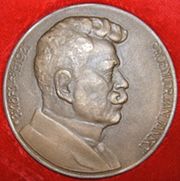
Jan Janský
Encyclopedia

Prague
Prague is the capital and largest city of the Czech Republic. Situated in the north-west of the country on the Vltava river, the city is home to about 1.3 million people, while its metropolitan area is estimated to have a population of over 2.3 million...
– September 8, 1921, Černošice
Cernošice
Černošice is a town in Central Bohemian Region, Czech Republic. The town is part of the Prague metropolitan area. It is located 5 km southwest of Prague, it lies on the Berounka River.Area: 9.06 km²Population: 5,302- Important personalities :...
near Prague) was a Czech serologist
Serology
Serology is the scientific study of blood serum and other bodily fluids. In practice, the term usually refers to the diagnostic identification of antibodies in the serum...
, neurologist
Neurology
Neurology is a medical specialty dealing with disorders of the nervous system. Specifically, it deals with the diagnosis and treatment of all categories of disease involving the central, peripheral, and autonomic nervous systems, including their coverings, blood vessels, and all effector tissue,...
and psychiatrist
Psychiatry
Psychiatry is the medical specialty devoted to the study and treatment of mental disorders. These mental disorders include various affective, behavioural, cognitive and perceptual abnormalities...
. He is credited with the first classification of blood
Blood
Blood is a specialized bodily fluid in animals that delivers necessary substances such as nutrients and oxygen to the cells and transports metabolic waste products away from those same cells....
into the four types
Blood type
A blood type is a classification of blood based on the presence or absence of inherited antigenic substances on the surface of red blood cells . These antigens may be proteins, carbohydrates, glycoproteins, or glycolipids, depending on the blood group system...
(A, B, AB, O) of the ABO blood group system
ABO blood group system
The ABO blood group system is the most important blood type system in human blood transfusion. The associated anti-A antibodies and anti-B antibodies are usually IgM antibodies, which are usually produced in the first years of life by sensitization to environmental substances such as food,...
.
Janský studied medicine
Medicine
Medicine is the science and art of healing. It encompasses a variety of health care practices evolved to maintain and restore health by the prevention and treatment of illness....
at Charles University in Prague
Charles University in Prague
Charles University in Prague is the oldest and largest university in the Czech Republic. Founded in 1348, it was the first university in Central Europe and is also considered the earliest German university...
. From 1899 he worked in a psychiatric clinic in Prague. In 1914 he was named professor
Professor
A professor is a scholarly teacher; the precise meaning of the term varies by country. Literally, professor derives from Latin as a "person who professes" being usually an expert in arts or sciences; a teacher of high rank...
. During World War I
World War I
World War I , which was predominantly called the World War or the Great War from its occurrence until 1939, and the First World War or World War I thereafter, was a major war centred in Europe that began on 28 July 1914 and lasted until 11 November 1918...
Janský served two years as a doctor at the front until a heart attack disabled him. After the war he worked as a neuropsychiatrist in a military Hospital (Vojenská nemocnice). He had angina pectoralis and died of ischaemic heart disease
Ischaemic heart disease
Ischaemic or ischemic heart disease , or myocardial ischaemia, is a disease characterized by ischaemia of the heart muscle, usually due to coronary artery disease...
.
Janský was also a proponent of voluntary blood donation
Blood donation
A blood donation occurs when a person voluntarily has blood drawn and used for transfusions or made into medications by a process called fractionation....
s.
Classification
Through his psychiatric research, Janský tried to find a correlation between mental diseases and blood diseases. He found no such correlation existed and published a study, Hematologická studie u psychotiků (1907, Hematological study of psychotics), in which he classified blood into four groups I, II, III, IV. At the time this discovery passed almost unnoticed. In 1921 an American medical commission acknowledged Janský's classification (over that of Karl LandsteinerKarl Landsteiner
Karl Landsteiner , was an Austrian-born American biologist and physician of Jewish origin. He is noted for having first distinguished the main blood groups in 1900, having developed the modern system of classification of blood groups from his identification of the presence of agglutinins in the...
, who classified blood into only three groups; and was for this (blood types) discovery awarded the Nobel Prize in Physiology or Medicine
Nobel Prize in Physiology or Medicine
The Nobel Prize in Physiology or Medicine administered by the Nobel Foundation, is awarded once a year for outstanding discoveries in the field of life science and medicine. It is one of five Nobel Prizes established in 1895 by Swedish chemist Alfred Nobel, the inventor of dynamite, in his will...
in 1930). Janský's classification remains in use today. A similar classification was described by William Lorenzo Moss, except the I and IV of Moss were the opposite to that of Janský's, leading to confusion in blood transfusion
Blood transfusion
Blood transfusion is the process of receiving blood products into one's circulation intravenously. Transfusions are used in a variety of medical conditions to replace lost components of the blood...
until the use of A, B and O became standard.
Legacy
- Frequent voluntary blood donors in The Czech Republic and SlovakiaSlovakiaThe Slovak Republic is a landlocked state in Central Europe. It has a population of over five million and an area of about . Slovakia is bordered by the Czech Republic and Austria to the west, Poland to the north, Ukraine to the east and Hungary to the south...
are awarded with Janský medal (Janského plaketa). - The Secret of Blood, a 1953 Czechoslovak film about his discovery.

